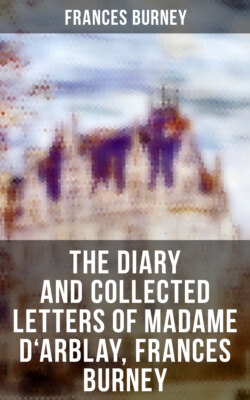Читать книгу The Diary and Collected Letters of Madame D'Arblay, Frances Burney - Frances Burney - Страница 96
На сайте Литреса книга снята с продажи.
Mr. Soame Jenyns’s Eulogy on “Cecilia”
ОглавлениеFriday, (Jan. 17, 1783.)—Now for this grand interview with Soame Jenyns.142 I went with my dear father who was quite enchanted at the affair. Dear soul, how he feeds upon all that brings fame to “Cecilia!” his eagerness upon this subject, and his pleasure in it, are truly enthusiastic, and, I think, rather increase by fulness than grow satiated.
We were late; there was a good deal of company, not in groups, nor yet in a circle, but seated square round the room, in order following,—Miss Ellerker, Mrs. Soame Jenyns, Mrs. Thrale, her daughter, Mrs. Buller, Mr. Cambridge, senior, Mr. Soame Jenyns, Mr. Selwin, Mr. Cambridge, junior, Miss Burgoyne, a lady or two I knew not, and three or four men.
Mrs. Ord almost ran to the door to receive us, and every creature of this company, contrary to all present custom in large meetings, stood up.
“Why have you been so late?” cried Mrs. Ord, “we have been waiting for you this hour. I was afraid there was some mistake.”
“My father could not come sooner.”
“But why would not you let me send my coach for you? Mr. Soame Jenyns has been dying with impatience; some of us thought you would not come; others thought it only coquetry; but come, let us repair the time as we can, and introduce you to one another without further delay.”
You may believe how happy I felt at this “some thought,” and “others,” which instantly betrayed that everybody was apprised they were to see this famous rencounter; and lest I should mark it less, every body still stood up. Mr. Jenyns now, with all the speed in his power, hastened up to me, and began a long harangue of which I know hardly a word, upon the pleasure and favour, and honour, and what not, of meeting me, and upon the delight, and information, and amusement of reading “Cecilia.”
I made all possible reverences, and tried to get to a seat, but Mrs. Ord, when I turned from him, took my hand, and leading me to the top of the room, presented me to Mrs. Jenyns. Reverences were repeated here, in silence, however, so they did very well. I then hoped to escape to Mrs. Thrale, who held out her hand to me, pointing to a chair by her own, and saying,—
“Must I, too, make interest to be introduced to Miss Burney?”
This, however, was not allowed; Mrs. Ord again took my hand, and parading me to the sofa, said,—
“Come, Miss Burney, and let me place you by Mrs. Buller.”
I was glad, by this time, to be placed any where, for not till then did the company seat themselves.
Mr. Cambridge, Sen., then came up to speak to me, but had hardly asked how I did before Mrs. Ord brought Mr. Jenyns to me again, and made him my right-hand neighbour, saying,—
“There! now I have put you fairly together, I have done with you.”
Mr. Soame Jenyns then, thus called upon—could he do less?—began an eulogy unrivalled, I think, for extravagance of praise. All creation was open to me; no human being ever began that book and had power to put it down; pathos, humour, interest, moral—O heavens! I heard, however, but the leading words; though every body else, the whole roon, being silent, doubtless heard how they hung together. Had I been carried to a theatre to hear an oration upon my own performances, I could hardly have felt more confounded.
I bowed my head during the first two or three sentences, by way of marking that I thought them over; but over they were not the more. I then turned away, but I only met Mrs. Buller, who took up the panegyric where Mr. Jenyns stopped for breath.
In short, the things that were said, with the attention of the whole company, would have drawn blushes into the cheeks of Agujari or Garrick. I was almost upon the point of running away. I changed so often from hot to cold that I really felt myself in a fever and an ague. I never even attempted to speak to them, and I looked with all the frigidity I possibly could, in hopes they would tire of bestowing such honours on a subject so ungrateful.
One moment I had hopes that Mr. G. Cambridge, in Christian charity, was coming to offer some interruption; for, when these speeches were in their height, he came and sat down on a chair immediately opposite Miss Thrale, and equally near, in profile, to me; but he merely said, “I hope Dr. Burney has not wanted his pamphlet?” Even Mrs. Thrale would not come near me, and told me afterwards it had been such a settled thing before my arrival, that I was to belong to Mr. Soame Jenyns, that she did not dare.
The moment they were gone, “Well, Miss Burney,” said Mrs. Ord, “have you and Mr. Jenyns had a great deal of conversation together?”
“O yes, a great deal on my part!”
“Why you don’t look quite recovered from it yet—did not you like it?”
“O yes, it was perfectly agreeable to me!”
“Did he oppress you?” cried Mr. Cambridge, and then he began a very warm praise of him for his talents, wit, and understanding, his knowledge, writings, and humour.
I should have been very ready to have joined with him, had I not feared he meant an implied reproach to me, for not being more grateful for the praise of a man such as he described. I am sorry he was present if that is the case; but the truth is, the evening was not merely disagreeable but painful to me.
